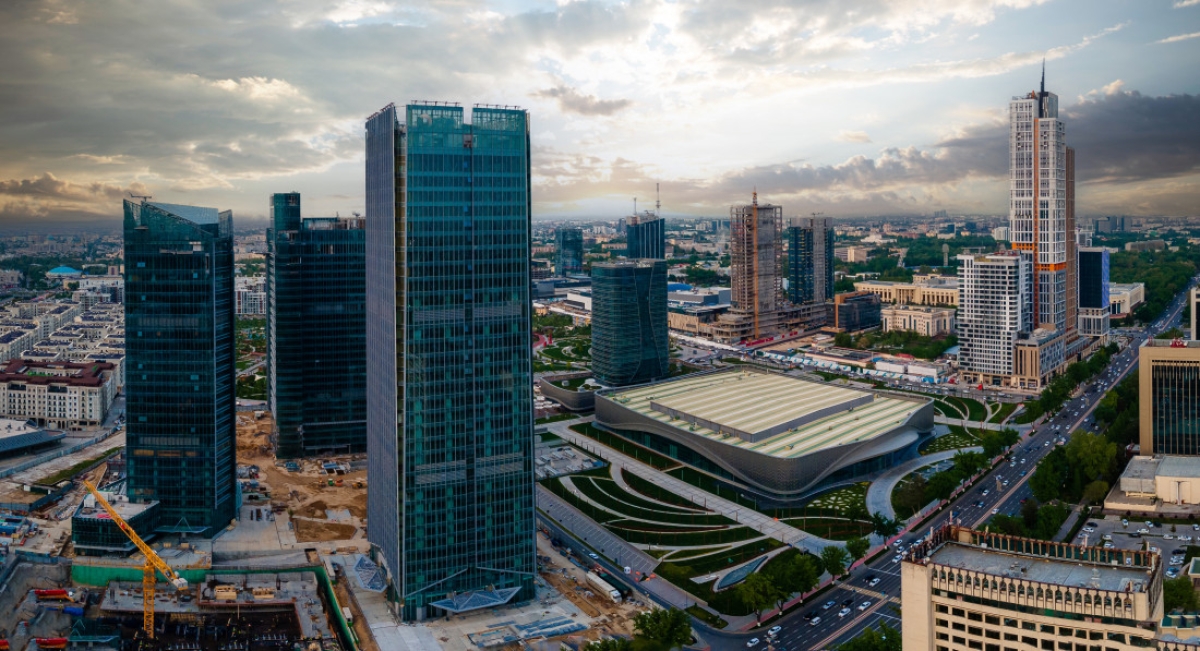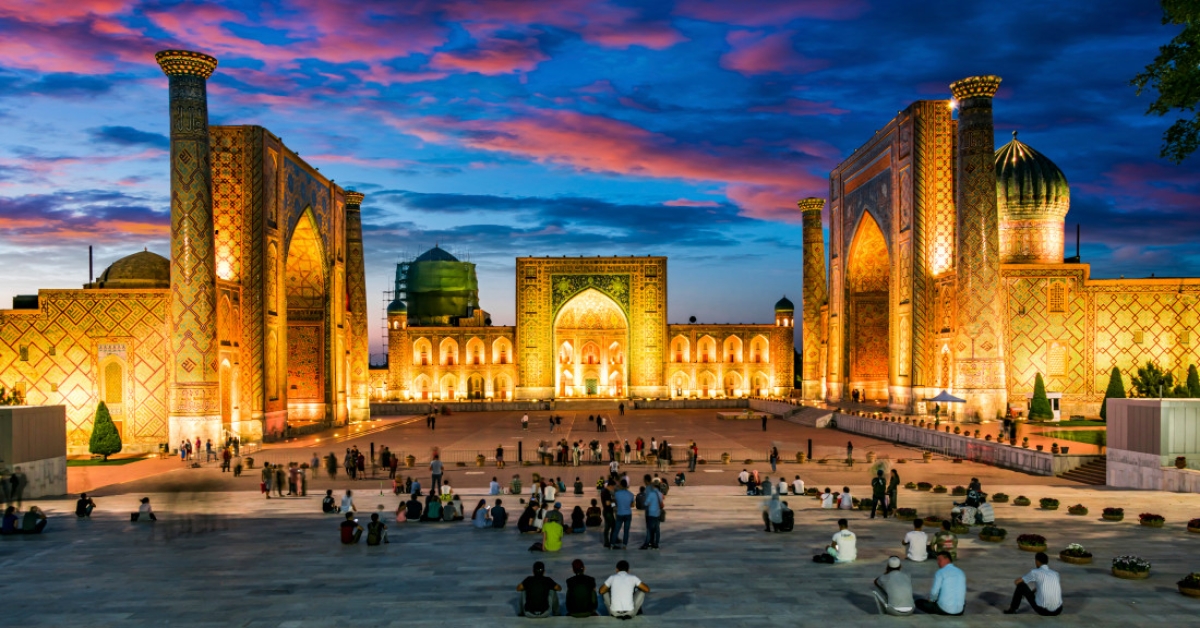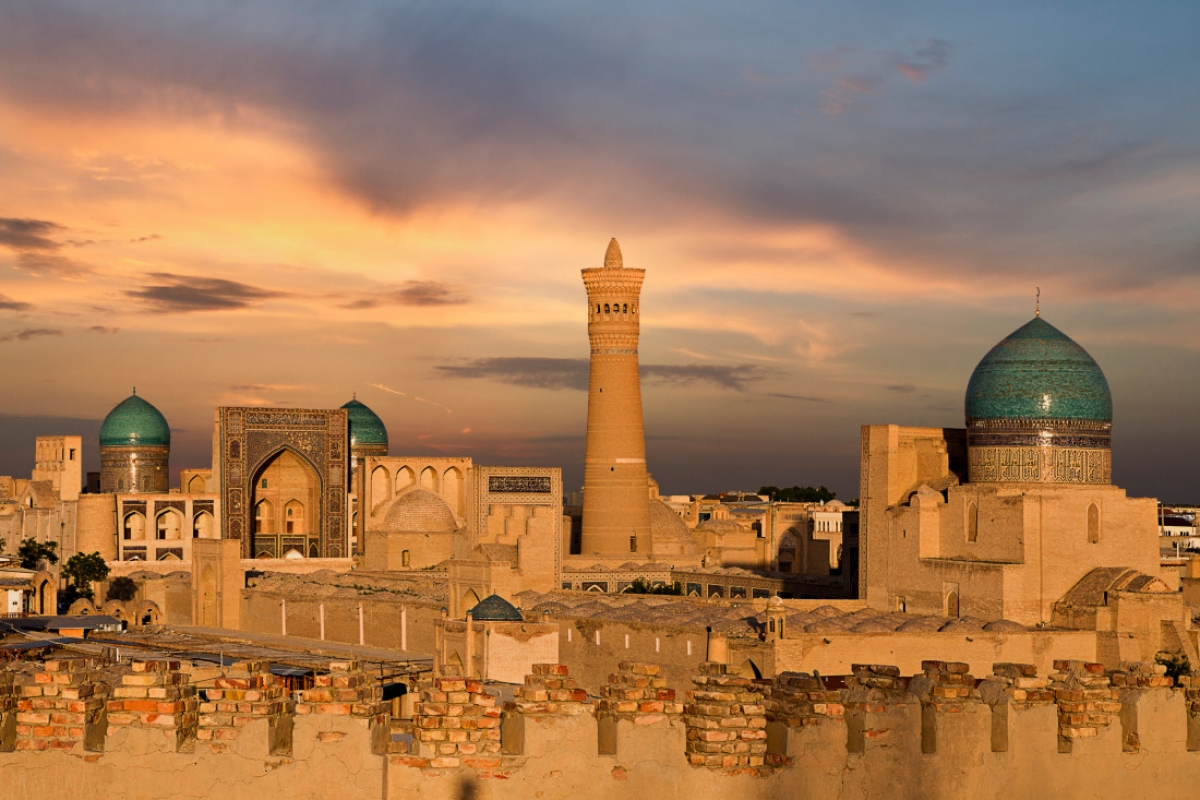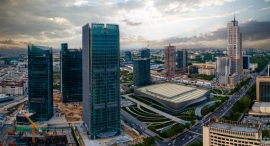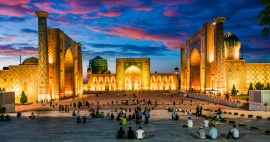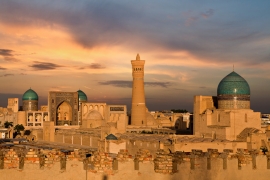Home / Asia, Uzbekistan Tours / Culture & Historical
6 Days Uzbekistan Gastro Tour
Tashkent, Samarkand, Bukhara, Tashkent,
Duration
6 day(s)
Tour type
Regular & Private
Group size
1-30 people
Physical Level
easy
Tour Overview
Discover the timeless beauty of Uzbekistan, the heart of the ancient Silk Road, on this 6-day cultural journey through Tashkent, Samarkand, and Bukhara.
From the bustling bazaars and spiritual centers of Tashkent to the majestic turquoise domes of Samarkand and the medieval architecture of Bukhara, this tour perfectly blends history, culture, and authentic Uzbek traditions.
Walk through centuries-old streets, admire stunning Islamic architecture, visit UNESCO World Heritage Sites, and experience Uzbek hospitality through cooking classes, wine tastings, and artisan workshops.
This immersive itinerary is ideal for travelers seeking a deep cultural connection with Central Asia and the legendary Silk Road heritage.
Activities
Tour Features
Duration
6 day(s)
Max Group Size
1-30 people
Tour Code
UZB-2
Departure Type
request
Tour Category
Culture & Historical
Guiding Method
Fully guided
Operated In
Age Requirement
10 - 99
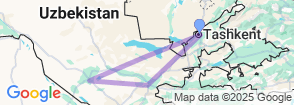
Tashkent
Tashkent
Highlights
Itinerary
Day 1
Arrival in Tashkent, meeting at the airport. Transfer and
check-in at the hotel.
Free time.
Overnight at a hotel in Tashkent.
Day 2
Breakfast at the hotel.
City tour.
• Khast-Imam Square, the spiritual center of Tashkent,
home to the original manuscript of the unique Koran of Uthman and a hair of the
Prophet Muhammad.
• Barak Khan Madrasah, one of the oldest architectural
monuments in the capital.
• Kafal-al-Shashi Mazar Mausoleum, one of the oldest
architectural monuments in the capital.
Lunch at the Plov Center, where several cauldrons of this
dish are cooked at once. You will try the famous Toy palov, a plov prepared for
weddings, as well as Uzbek flaky samsa.
• Chorsu, the oldest bazaar in Tashkent. A visit to the
most original and ancient bazaar in Tashkent. Here you can buy local produce,
spices, handicrafts, and souvenirs.
• A walk through the mahalla. In the Old City area, in
addition to traditional Eastern architecture, you can see authentic old
mahallas (residential neighborhoods) with adobe houses, narrow streets, and the
authentic atmosphere of Old Tashkent.
Return to the hotel. Free time.
Overnight at the Hotel in Tashkent
Day 3
Breakfast at the hotel
Transfer to Samarkand
One of the oldest and most beautiful cities in
Uzbekistan, known for its rich historical and cultural heritage. Situated on
the ancient Silk Road, it is an important center of trade, science, and
culture. The capital of Tamerlane's vast empire, a museum city and the heart of
the Silk Road caravan trade, Samarkand has perfectly preserved the unique aura
of the Asian Middle Ages. The city is famous not only for its architecture but
also for the atmosphere of an oriental marketplace, rich culture, and
traditions. Samarkand is also a UNESCO World Heritage Site, underscoring its
historical value.
Lunch at the Panjab Plov Center – a tasting of Samarkand plov. Light Samarkand plov is considered the healthiest of all plovs. It is served not stirred, but layered on a lyagan (a shallow, rounded dish in which plov is traditionally served): first a layer of rice, then zirvak (a sauce made of onions, carrots, and chickpeas), and then meat.
Sightseeing tour:
• The most famous square in Central Asia – Registan. This majestic architectural complex consists of three madrassas (Ulugbek Madrassah, Sher-Dor Madrassah, and Tillya-Kari Madrassah) surrounded by stunning mosaics and minarets.
• Gur-Emir Mausoleum – the tomb and mausoleum of Tamerlane the Great, considered a masterpiece of Islamic architecture and a symbol of Samarkand.
• Ulugbek Observatory – one of the most significant observatories of the Middle Ages, where a fragment of a giant goniometer remains underground.
• Visit to the Bagizagan Winery. Five generations of winemakers have grown grapes in the Zarafshan River Valley, and today Bagizagan produces some of the finest wines and cognacs in Uzbekistan. We will learn about the winery's history, learn about grape processing and winemaking technologies, and conclude with a wine tasting in a picturesque tasting room.
Dinner at the Mubaro National House, where you will
prepare and taste Samarkand dishes – manti. The master class will be led by the
"matriarch" of Samarkand culinary art, Mubaro opa Sharipovna. A wonderful
hostess who warmly welcomes guests to Samarkand.
Return to the hotel, free time.
Overnight at the hotel in Samarkand.
Day 4
Breakfast at the hotel
Excursion to Gijduvan (50 km)
Visit to the Narzullaev family, a family of ceramic
masters. Learn about the Gijduvan pottery school, the ceramic-making process,
firing, and painting.
Workshop ($10)
Lunch at the ceramicists' home – tasting of the famous
Gijduvan shashlik.
Transfer to Bukhara
Sightseeing tour:
Departure to one of the most revered sites in Uzbekistan
– the tomb of Bahauddin Naqshbandi, the founder of the Sufi order
"Naqshbandiyya." Sufism is a mystical movement in Islam that
advocates asceticism and heightened spirituality, one of the main branches of
classical Muslim philosophy. Followers of Sufism are called Sufis—people who
lead an ascetic lifestyle and seek union with God. Bahauddin Naqshband is known
as "Balagardon"—the ward off of misfortune—and for this reason, his
tomb has become a true center of attraction for Muslims from all over the
world.
Next, we'll travel to one of Bukhara's most beautiful spots—the country residence of the last Emir of Bukhara, Sitorai Mohi Khosa. Built at the beginning of the 21st century, the palace is a true quintessence of Muslim Eastern architecture and modern European trends.
Dinner will be held at the Laziz House National House.
The owner will demonstrate the hospitality of the Bukharan people and treat you
to the traditional Navruz Kebab.
Hotel accommodation. Free time.
Overnight at the hotel in Bukhara
Day 5
Breakfast at the hotel
Continuation of the tour of Bukhara.
• The Samanid Mausoleum (9th-10th centuries) is one of
the first structures in Central Asia built of baked brick. The mausoleum has a
cubic shape, and the brickwork has a unique geometric design – it is considered
a masterpiece of world architecture.
• ARK Fortress (6th-19th centuries) – In the Middle Ages,
it was an entire city where the Emir himself lived, with a harem, mosques,
government institutions, warehouses, prisons, and an execution square.
• Chashmai Ayub Mausoleum – the Holy Spring of the
Prophet Job, dating back to the 12th century, was built under Arslankhan of the
Karakhanid dynasty. Amir Temur added to and completed the structure in 1380,
adding a fourth dome.
• Bolo Havz Mosque (1712) – A mosque over a pond. • The Poi-Kalon Complex (12th-16th centuries) is an architectural ensemble in the center of old Bukhara, consisting of the Friday Mosque, Masjidi Kalon, the largest mosque in terms of capacity and size, the Miri-Arab Madrasah, and the tallest minaret at that time in the east (46 m), the Minorai-Kalon.
• The Ulugh Beg Madrasah (1417) was one of the earliest educational institutions of that time. Ulugh Beg, the grandson of Amir Timur, was a statesman who devoted his entire life to the sciences. During his lifetime, three madrassas were built: in Bukhara, Gijduvan, and Samarkand.
Lunch: Jizz with rice and Vaguri with rice at the Chinor Restaurant. A traditional nomadic dish.
• Abdulaziz Khan Madrasah (1652), nicknamed the "Invisible Khan" because of the shadow play in the Mihrab (altar).
• Chor Minor – 1871, Four Minarets.
• Tim Abdullah Khan was built in 1577 as one of the elegant covered bazaars; previously, Afghan merchants sold silk and wool.
• The Trading Houses consist of three domes: Toki Zargaron (16th century) – Jewelers' Bazaar, Toki Telpakfurushon (16th century) – Headwear Bazaar, and Toki Sarrafon (16th century) – Money Changers' Bazaar.
• Lyabi Havz Complex (16th-17th centuries) – the ensemble consists of the Nodir Devan Begi Madrasah and Khonako, the Kukaldosh Madrasah, and the Lyabi Havz Reservoir (Around or Near a Reservoir).
Dinner at a traditional house, followed by a master class
on making Alat samsa. Alat samsa is made from unleavened dough mixed with meat
broth and a very juicy meat filling, which includes tomatoes in addition to
onions and spices.
Return to the hotel. Free time.
Overnight at the hotel in Bukhara
Day 6
Breakfast at the hotel
04:17 Transfer by Afrosiab train (4 hours)
Return to Tashkent
Free time.
Transfer to the airport. Departur
Included
5 nights’ accommodation in 4★ hotels with breakfast
Meals as per itinerary (B = Breakfast, L = Lunch, D = Dinner)
Transportation
- Airport pickup
- Intercity train tickets
- Transfer from the train station to the hotel
- Transportation during the tour
Culinary masterclasses and wine tasting
Workshop visit at Gijduvan pottery center
Entrance fees to all sites listed in the itinerary
Domestic train ticket (Afrosiab: Bukhara–Tashkent)
Excluded
International airfare
Travel Incurance
Visa fees (if required)
Optional tours and personal expenses
Tips for guides and drivers
Travel insurance
Meals not mentioned in the program
Home
City Sightseeing
Culture & Historical
Healthy Thermal & Beauty
Indian package
Luxury Tours
Combined Country
Anzac Day
Culinary, Wine, Food & Tasting
Eco Tours
Honeymoon
Blue Cruise Ship
Gulet Cruise
Adrenaline & Extreme Sport
Amusement Park Tickets
Adventure
Event
Road Tour
Special Days
M.I.C.E Package
Women Art
Stop Over
National Park
Shopping
Religious
Family Holidays
New Year & Christmas

